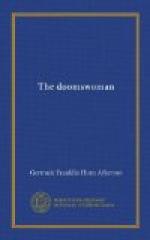“It is not! Do you think I will give her up for a trifle like that?”
“But why not accept this break? You cannot marry her—”
“Oh, do not refer to that nonsense!” he exclaimed, harshly. “I shall peel off her traditions when the time comes, as I would strip off the outer hulls of a nut. Go! Go, Eustaquia!”
Of course I went. Chonita was not at the rodeo-ground, but, escorted by her father, had gone home. I followed immediately, and when I reached Casa Grande I found her sitting in her library. I never saw a statue look more like marble. Her face was locked: only the eyes betrayed the soul in torment. But she looked as immutable as a fate.
“Chonita,” I exclaimed, hardly knowing where to begin, “be reasonable. Men of Estenega’s brain and passionate affectionate nature are always weak with women, but it means nothing. He cares nothing for Valencia Menendez. He is madly in love with you. And his weakness, my dear, springs from the same source as his charm. He would not be the man he is without it. His heart would be less kindly, his impulses less generous, his brain less virile, his sympathies less instinctive and true. The strong impregnable man, the man whom no vice tempts, no weakness assails, who is loyal without effort,—such a man lacks breadth and magnetism and the power to read the human heart and sympathize with both its noble impulses and its terrible weaknesses. Such men—I never have known it to fail—are full of petty vanities and egoisms and contemptible weaknesses, the like of which Estenega could not be capable of. No man can be perfect, and it is the man of great strength and great weakness who alone understands and sympathizes with human nature, who is lovable and magnetic, and who has the power to rouse the highest as well as the most passionate love of a woman. Such men cause infinite suffering, but they can give a happiness that makes the suffering worth while. You never will meet another man like Diego Estenega. Do not cast him lightly aside.”
“Do I understand,” said Chonita, in a perfectly unmoved voice, “that you are counseling me to marry an Estenega and the man who would send me to Hell hereafter? Do you forget my vow?”
I came to myself with a shock. In the enthusiasm of my defense I had forgotten the situation.
“At least forgive him,” I said, lamely.
“I have nothing to forgive,” she said. “He is nothing to me.”
I knew that it was useless to argue with her.
“I have a favor to ask of you,” she said. “Most of our guests leave this afternoon: will you let me sleep alone to-night?”
I should have liked to put my arm about her and give her a woman’s sympathy, but I did not dare. All I could do was to leave her alone.
XXV.
Casa Grande held three jealous women. The situation had its comic aspect, but was tragic enough to the actors.




